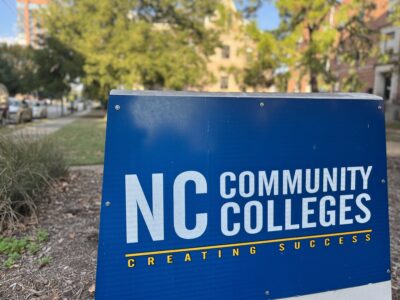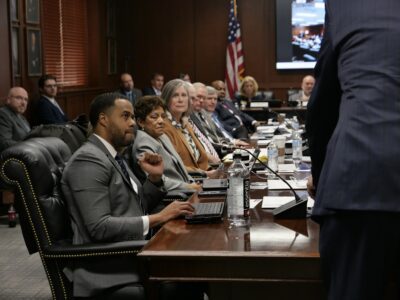
|
|
The State Board of Community Colleges voted on Friday to create a permanent grant director position at the system office with the goal of bringing in additional grant money to the North Carolina Community College System (NCCCS).
This full-time grant director will help the system increase its federal, private, and local grant funding while also serving as a resource for local colleges. The latter part of the job is something for which many rural college presidents have advocated, as many small colleges have limited capacity to apply for and manage grants.
“We’ve not, at the system office, had a dedicated grant writer or grants person on staff,” said NCCCS Chief of Staff Dr. Kimberly Gold. “This would be the first of its kind for us to really have that focus and effort.”
The Board’s decision follows an update last month that the candidate hired in January for a grant-funded version of the position had since withdrew their acceptance. The temporary position only had one year of secured funding, which NCCCS staff gave multiple candidates concern.
During last month’s discussion, Chair Tom Looney asked if the Board was allowed to convert funds for a full-time grant director. He expressed worry that the process was moving too slowly, potentially leaving a lot of current funding opportunities on the table.
“If this is a priority, we should treat it like a priority,” he said. “If it’s not, we should continue on the path we’re on.”
In order to create the full-time position, the Board voted to reorganize funds from the system’s finance department to its executive department. The grant director position will replace a business officer position that has been vacant for more than 800 days. That vacant business officer position was funded for a salary of $72,278.
The system anticipates a grant director’s salary of $90,000 to $99,000. That means the Board approved creating the position using a mix of funding. Approximately 80% of the grant director’s salary will come from regular funds, and the other 20% from grant funding the director will secure.
“We felt that we might get more qualified candidates if they knew that the funding source was recurring, and the job was more stable,” Gold said. “The grant funds that were available for this position, we still have those funds. So this would give us a 2-3 year runway, if needed… to support that 20%.”
About half of the director’s job will involve the development of grant proposals, according to the Board’s agenda packet. Another 30% will involve identifying funding opportunities and the remaining 20% will be grant management.
The Director of Grants will be responsible for leading the grants and funding efforts for the North Carolina Community College System. This position plays a vital role in securing external funding to support the System’s strategic goals with a specific focus on federal funding. The successful candidate will be a seasoned grants professional with a track record of securing grants, managing grant programs, and ensuring compliance with funding requirements. This position reports to the Vice President of Strategic Initiatives and works closely with the Associate Vice President of Strategy and Rural Initiatives and the Vice President of Economic Development.
Director of Grants job description, included in the Board’s agenda.
Hiring a grant director is part of the system’s efforts to meet its performance growth target for grant funding in the system.
According to the goal document discussed last month, the system’s year 1 goal is to apply for and raise $8 million in grant funding. The document lists a goal of $20 million for year 2 and $40 million by year 3.
For context, the system brought in approximately $5 million in grants in 2021 and 2022 and over $31 million in 2023.
As the system works to increase its grant funding, some Board members expressed concern about the stability of grant-funded positions.
Personnel Committee Chair Bill McBrayer said that 76 of the system office’s employees are partially or completely funded through grants — nearly 32% of system staff. Of those, 23 employees (9.5%) have grant-funded, time-limited positions.
Gold said that many of those employees are part of the system’s workforce department. NCCCS President Dr. Jeff Cox added that the system works to plan and coordinate grant cycles to continue funding such positions. Additionally, he said that the system also receives some grants consistently that are not time-related.
“By the nature of our business, we’re going to have a fair number of grant positions,” Cox said. “Any time we bring in more grants… to manage those grants, you use the grant dollars to hire more people to administer those grant funds. It’s just kind of an inevitable part of our operations.”
Reelection process for local presidents
State law has historically given the State Board of Community Colleges the authority to approve or deny the election of local college presidents by local boards of trustees. The 2023 budget, passed in September, adds reelection authority to the Board.
In January, the Board interpreted that added statute as requiring State Board approval for any contract renewals, extensions, or amendments for local presidential contracts. That month, the State Board proposed an amendment to the State Board of Community Colleges code to reflect that.
On Thursday, the Board’s policy and governance committee presented an updated amendment, which would give the Board final approval in the reelection of local presidents.
The proposed amendment says, “The local board of trustees shall ensure that any motion to approve the proposed employment contract renewal or extension is contingent upon the approval of such reelection by the (Board).”
The amendment, if approved, would also require the chair of local boards to submit “a letter notifying the State Board of Community Colleges of its approval of a proposed presidential contract renewal or extension at least ninety (90) days prior to the expiration of the Existing Presidential Contract.” The amendment also lays out a process for colleges that do not have a contract for their presidents.
Among other things, that letter should include the current and new expiration date, affirmation that the local board has completed the president’s evaluation in compliance with Board code, and any “new contractual provision, or modification of any contractual provision” of the president’s existing contract.
“The SBCC may request additional materials from the local board of trustees it may reasonably deem necessary to consider the approval of the reelection of the college president,” the proposed amendment says.
Some Board members expressed concern that the new amendment is overly burdensome on local boards or gives too much authority to the Board.
Board Policy and Governance Committee Chair Chaz Beasley emphasized that the Board does not want to micromanage local colleges. However, he said the Board must comply with state law.
“We want to always ensure we have the support of our presidents, the support of our trustees, and the support of our external stakeholders,” Beasley said in February.
Board member Mark Merritt said the current amendment is unclear about what level of scrutiny the Board should provide or what materials it will review. Merritt said he would like to see further revisions to that end.
The full Board is set to vote on the amendment in May, Beasley said. The version that the Board votes on could include revised language.
On Friday, the Board did vote to approve the reelection of Brunswick Community College President Dr. Gene Smith, who has served in the role since 2018.
After the Board takes an initial vote on the reelection amendment revision, a period of public comment will begin.
EdNC will include updates on how and when to submit public comment as this item is voted on by the Board. To submit public comments on amendment revisions, visit the system’s web page on numbered memos.
You can read the most updated draft of the amendment below.
Next NC, ERP modernization, and more
Last November, the state announced a new scholarship that awards full tuition for the state’s 58 community colleges to North Carolina students from households making $80,000 or less.
The scholarship, called Next NC, also covers more than half of tuition costs at the 16 public universities in the UNC System. You can read more about the eligibility guidelines for the scholarship here.
On Thursday, the Board’s transformative discussion included an update on Next NC — “North Carolina’s New Financial Aid Program,” per the Board’s document.
The Next NC Scholarship combines the federal Pell Grant with the state-funded financial aid program to form a simplified and predictable scholarship award that’s easier to understand and makes education more affordable for most North Carolinians. It’s an opportunity to pursue the degree you need for the career you want – and the future you choose.
Next NC’s website
Board members discussed the need to market the scholarship to the public, noting that many North Carolinians and students have not heard of the scholarship.
Marketing is especially important given the major delays and glitches in the new Free Application for Federal Student Aid (FAFSA). Those delays have resulted in significant declines in completion rates, which are down about 25% compared to this same time last year for North Carolina’s graduating high school seniors.
Blue Ridge Community College President Dr. Laura Leatherwood said colleges cannot control the FAFSA glitches, but they can control what information they push out to students in the meantime. Students need to know about Next NC once their financial aid packages are finalized, she said.
“If colleges aren’t getting that message out to the extent that they can… that will be a missed opportunity,” Leatherwood said.
The Board also heard a brief presentation on the system’s development of a statewide five-year marketing plan. The 2023 budget allocated $1 million toward the system’s statewide marketing efforts.
In July, the Board is set to receive a comprehensive report on the five-year plan. In the meantime, Board members will receive a survey regarding the marketing priorities on which the system should focus.
“This has to be an integrated marketing plan that really delivers results for our colleges,” Looney said.
Here are a few other items from the Board’s April meeting:
- The Board approved a contract to support its ERP modernization work. The contract includes funding of up to $1.2 million “for integration services with third-party providers during Phase 4 of the ERP Modernization.” These updates should eventually improve data collection and sharing across the system.
- Estimated receipts for the NCCCS are up, according to a March 2024 projection, reflecting enrollment growth across the system.
- The Board approved an allocation “not to exceed $837,824 to Lenoir Community College (LCC) to provide administrative support for the North Carolina Motorcycle Safety Education Program (NCMSEP).” The General Assembly created the NCMSEP in 1989 to establish and fund a program of motorcycle safety instruction through the NCCCS, according to the Board’s meeting document. Students who graduate from the program can receive a discounted insurance rate.
- The Board also approved an allocation of $350,000 to support the 10 colleges in Cohort 2 of the Digital Navigator Project. The Board’s meeting document says: “The overall goal of the Digital Navigator Project is to promote digital inclusion to ensure economic mobility and civic participation for students at NC community colleges affected by the digital divide by certifying and deploying trained digital navigators at 20 community colleges that serve Tier 1 and/or Tier 2 counties (10 colleges in Year 1 and 10 colleges in Year 2).”
- Finally, the Board also received a draft of the 2024-25 State Board of Community Colleges Handbook, which you can view here. The handbook includes information on the role and policies of the Board, requirements in state law, and more.
The full Board meets next May 17-18 in Raleigh.







